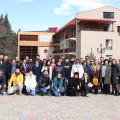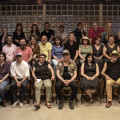To what extent do you consider the First Artsakh War to be sufficiently reflected in Armenian literature?
To what extent is the young generation informed about this war and the victory?
To what extent has the achievement of independence been reflected in our literature? What about the process where the country was ruled by a criminal regime for around 20 years? Why doesn’t anyone “demand” that we take a civic position on these issues? The question about the war and victory seems to imply that we should glorify and exaggerate that victory, as has been done over the past two decades, but I have seen the difficult “day-to-day life” that allowed us to win, because I went to fight in 1992 as part of a volunteer squad. When we were suffering defeats on the battlefield and experiencing huge losses, nobody could have expected or dreamed about the outcome that we achieved in 1994.
There are various stereotypes that suggest that writers and cultural figures must provide a reflection on everything and make this accessible to the people. I think that culture and literature have their own internal agenda and sense of rhythm. The whole question seems unnatural to me. Stalin had put forward the order for cultural figures to “service” the military effort during the Second World War, when the need to foment hate against the enemy meant that the Soviet ideal of internationalism was temporarily replaced by the encouragement of national sentiment, including rekindling historical issues. While we did end up with a historical novel of the likes of Vardanank, the fact is that this was the result of dictatorial propaganda. As for the First Artsakh War, I launched an Armenian-Azerbaijani website in four languages in 2005 and studied the available material. There were very few items that would interest a speaker of another language, including those related to the war. I eventually chose a story by Levon Khechoyan. The Azerbaijanis submitted drama pieces about mixed families, and I selected a few of them.
But even if the writers had provided a complete reflection on the war and delivered important messages to the people through several dozen novels and stories, those words would ring out like an echo in an empty room. Our readers had stopped reading literature, even the most famous writers of that time only had several hundred readers.
Otherwise, the best writers and artists are always ahead of their times. They are always the ones that preach progress, good relations with neighbors, human rights, identity protection, and so on. For example, in my novel Hiding for the Cross, which relates to the history of Cilicia during the Crusades, both the Christian and Muslims characters call each other “non-believers” but they are HUMAN BEINGS and each of them has the interests of their state in mind, working with “the enemy” when necessary.
So, our literature has reflected reality, to one extent or the other. But the youth that took shape in an anticultural and politicized environment is almost unaware of these cultural pieces. Let me give you an example from the world of fine arts. Ghazanchyan’s series called “EYEWitness” is a reflection of the Second Artsakh War. It is the image of the bitterness that I felt and the terrible scream that was never voiced aloud. Unfortunately, I am convinced that most of society will remain unaware of this narrative that conveys the whole horror of the young soldiers that were lost during the 44-Day War, even when it is eventually presented as a separate exhibition.
What thoughts were born as a result of the Second Artsakh War and the defeat we suffered?
The same thoughts that I have expressed in my words and writings on many occasions – it was wrong to waste that quarter century of peace in Armenia on the establishment of a regime focused on money and bribery. Let me clarify that – relative peace, so that readers don’t think that I am overlooking the people that died in that period. No matter how things would have developed, we would have been in a stronger position and, most importantly, there would have been a lower loss of human life.
The third article of the PEN Charter mentions peace, good understanding between nations, and respect. How realistic is this after the war?
It is realistic. There were many more wars and conflicts before the Second World War, but relations then managed to normalize between those sides.
The three former presidents of Armenia attempted to launch relations with Turkey. Why did Turkey not adopt a neutral stance during the Second Artsakh War?
They had been sharpening their swords. Until that point when some powers had managed to install Trump as President, holding the USA back and disrupting the balance of power in our region and the ones around us. That provided a new opportunity for aggression to Erdogan.
Can a writer’s words and text play a role in peacebuilding initiatives and succeed? Will these words be understood and accepted?
They can play a role, but the sides in this conflict are not just our two peoples, and we are not countries with mixed Armenian-Azerbaijani populations, so our focus is not on preventing internal conflicts or changing the atmosphere within our borders. After this bloody battle, there needs to be mutual understanding on an international level and, after that, writers can express themselves and their words will be accepted.
For many years, we have seen that Armenian and Azerbaijani or Armenian and Turk intellectuals and civil society actors have met and participated in various seminars both in Yerevan and Baku as well as in several corners of the world, with considerable grants spent on these events. Why was all of this unable to serve its purpose, globally speaking, of establishing peace and reconciliation, and why did the Second Artsakh War take place?
The war took place because the people of the two countries, for the most part, were not the ones that elected their rules, and those rulers in turn had not sincerely sought and found a formula for peace. These seminars and “grants” are not to blame – they were supposed to lay the ground for peace, but that peace had to be delivered by the governments. Azerbaijan adopted a harder stance about this contact over time while Armenia ignored these events during the times of Kocharyan and Sargsyan. Those meetings were attended by a small number of ambassadors for peace, and the end result was this bloody war.
The three former presidents of Armenia attempted to launch relations with Turkey. Why did Turkey not adopt a neutral stance during the Second Artsakh War?
Turkey was not neutral during the First Artsakh War either, they closed the border with Armenia. Turkey took certain steps in the twentieth century to build a modern, secular state. Now they are making announcements about possible collaboration. We must discuss, albeit very carefully, a formula for coexistence, so that we can start a period of intense development after these heavy losses.
So how can we establish good neighborly relations with Azerbaijan if they don’t return our compatriots that they hold prisoner?
The prisoners must be returned and war crimes must be investigated. They have also made some allegations against our side and I do not rule out the possibility that some of them may be true. Are both sides ready to punish the guilty parties? If not, let us work together where possible, until peace allows us to raise the standards for our human rights claims.



